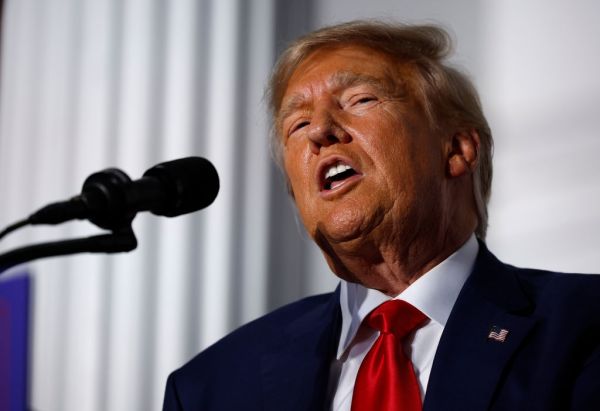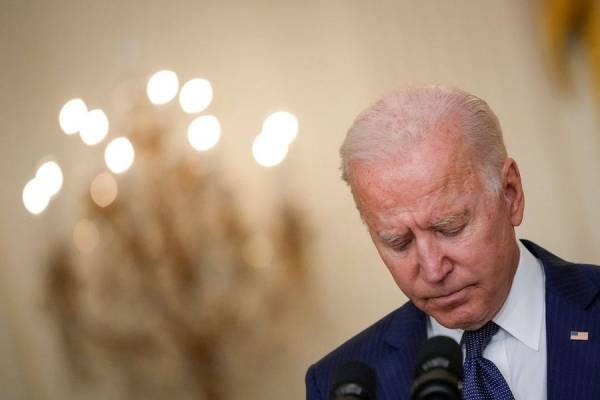Our late friend Charles Krauthammer once argued, “You’re betraying your whole life if you don’t say what you think and you don’t say it honestly and bluntly.” And if there’s ever a time to be blunt, it’s now.
The American people should demand better than the decision our two decaying, corrupted parties—channeling the dueling forces of tribalism and inertia—are set to thrust upon them. “This is probably the most uniquely horrible choice I’ve had in my life,” Andrew Collins, an independent voter from Maine, recently told the Associated Press.
Collins is neither alone nor unjustified in thinking so. In a recent Reuters survey, nearly 7 in 10 respondents reported being “tired of seeing the same candidates in presidential elections” and wanting “someone new.” Decline, as Krauthammer believed, is a choice. But Americans today don’t have many other options.
Joe Biden ran for president four years ago promising to rise above the partisan rancor of the day and to “draw on the best of us, not the worst.” In his inaugural address, he said his “whole soul” was in “uniting our people” and “uniting our nation.”
He hasn’t governed that way.
In early 2021, President Biden demagogued Georgia’s new election law—which coincided with record voter turnout the following year—as “Jim Crow 2.0.” He’s openly bragged about his administration’s efforts to circumvent Supreme Court rulings, and he’s embraced extreme abortion positions that he’d opposed his entire career. Democrats’ profligate spending in 2021 and 2022 didn’t cause the rampant inflation we’ve all been living with for years, but even progressive economists now admit that White House-backed legislation exacerbated it. Biden’s approach to the border and immigration policy has been confused and ineffective, and the weakness he’s projected on the world stage—starting with his disastrous decision to withdraw from Afghanistan and cede the nation to the Taliban—has empowered or emboldened strongmen and terrorist organizations around the globe. As the Houthis’ ongoing attacks in the Red Sea demonstrate, under Biden, the United States is more afraid of escalation than a group of ragtag militias is.
Yet, Biden’s worst act as president may very well be his stubborn refusal to step aside.
Campaigning for the White House in 2019 and 2020, a 77-year-old Biden signaled—both privately and publicly—that he would only serve one term in office. “Look, I view myself as a bridge, not as anything else,” he said at a campaign event in March 2020. “There’s an entire generation of leaders you saw stand behind me. They are the future of this country.”
But now in power, an 81-year-old Biden has changed his mind. Despite his clearly diminished faculties—and a majority of even his own voters believing he’s too old to serve another term—the president has convinced himself he is indispensable. “If you thought you were best positioned to beat someone who, if they won, would change the nature of America, what would you do?” he recently told The New Yorker. “I’m the only one who has ever beat him. And I’ll beat him again.”
“Him,” of course, is Donald Trump. And if the election were held today, Trump would be projected to win—relatively easily.
That would be a disaster.
Donald Trump is manifestly unfit for the presidency. Whether you also thought that was the case in 2016 or 2020 is immaterial; his conduct after losing four years ago, and the campaign he has run this time around, have rendered him a unique threat to the constitutional order.
But don’t just take our word for it. More than 40 men and women served in Donald Trump’s Cabinet during his first term, and fewer than 10 of them have publicly endorsed his reelection bid. Among those who worked most closely with Trump, more came away considering him a danger to the country than believing he deserves another four years in office. Gen. John Kelly, whom Trump hired twice—once as homeland security secretary and once as chief of staff—has described his former boss, on the record, as “a person that has nothing but contempt for our democratic institutions, our Constitution, and the rule of law.”
Kelly is just one of dozens of former high-ranking Trump administration officials who left the White House concerned—or alarmed—by what they saw. During his first term, according to various aides and Cabinet officials, Trump floated pulling the United States out of NATO, using a nuclear weapon against North Korea, ordering the military to shoot protesters in Washington, D.C., and withdrawing thousands of U.S. troops from Afghanistan, Germany, Iraq, Syria, and Africa on a whim. And the guardrails that prevented such crises the first time around won’t be there if Trump is reelected.
“Trump needs people around him who will push back and help keep him on the straight and narrow,” former Attorney General William Barr—another erstwhile Trump ally—told Fox News in December. “During his first term, the main way that could be done is by pointing out to him how this would hurt his prospects for a second term. Once he wins a second term, I don’t know what considerations can be used to push back against bad ideas.”
Based on Trump’s current inner circle, those “bad ideas” wouldn’t just go unchecked in a second term—they’d be embraced and actively encouraged. Instead of Defense Secretary James Mattis, imagine Defense Secretary Michael Flynn. Instead of Dan Coats as director of national intelligence, imagine Kash Patel.
In 2016, Trump ran on trade protectionism, an isolationist foreign policy, and a crackdown on both illegal and legal immigration—policy ideas with which we may have disagreed but which, to paraphrase the late P.J. O’Rourke, were wrong within normal parameters. Watch a Trump rally today, though, and it immediately becomes clear that policy—of any kind—couldn’t be further from his mind.
“The radical left Democrats rigged the presidential election of 2020, and we’re not going to allow them to rig the presidential election of 2024,” Trump said in Richmond, Virginia, on Saturday. “Every time the radical left Democrats, Marxists, communists, and fascists indict me, I consider it a great badge of honor. I’m being indicted for you. I stand before you today, not only as your past and hopefully future president—because we’re going to turn this country around fast—but as a proud political dissident. I am a dissident.”
Indeed, Trump’s entire campaign this time around is centered on “retribution”—against the “Marxists and communists” who are prosecuting him over his myriad alleged crimes, yes, but also against Republicans who have dared break with him on issues big or small. “We’re getting rid of the Romneys of the world,” he boasted to his supporters this week. “We want to get Romneys—and those—out.”
We make no apologies for our classical liberal worldview and believe this country desperately needs a healthy conservatism to deal with the many challenges it faces. But the overlap in a Venn diagram of conservatism and capital-R Republicanism has never been smaller. Any policy victories stemming from a second Trump presidency would be pyrrhic, either undone by the electoral backlash that is sure to follow or overshadowed by the authoritarian bent of his administration. What good are “conservative” gains if “conservatism” is defined today by loyalty to Donald Trump and tomorrow by the febrile musings of Steve Bannon and Stephen Miller?
When the television cameras are off, even some of Trump’s biggest boosters might agree. “We’re all pretending we’ve got a lot to show for it, because admitting what a disaster it’s been is too tough to digest,” Tucker Carlson said of Trump’s four years in office in text messages revealed as part of Dominion Voting Systems’ lawsuit against Fox News. “But come on. There really isn’t an upside to Trump.”
Even if we believed a second Trump term would bring solutions to the country’s biggest problems—and we do not—a president should not be rewarded with power again after attempting to stage a soft coup and throwing the country into a constitutional crisis.
And despite years of partisan actors’ insulting efforts to minimize and distort what happened, that is precisely what Trump did in the months leading up to January 6, 2021, and on that fateful day itself. For a brief moment, this was not controversial. Senate Minority Leader Mitch McConnell made clear he believed Trump was “practically and morally responsible” for the carnage, as did then-House Republican Leader Kevin McCarthy; Sen. Tom Cotton went so far as to label those who stormed the Capitol on the president’s behalf “insurrectionists.”
All three men have endorsed Trump’s bid to return to the White House.
Nothing McConnell, McCarthy, or Cotton said in January and February 2021 is any less accurate today, and there’s no reason to believe any of them feel any different about the former president now than they did then. It’s not as though Trump himself has shown any remorse for his actions—just this week, he repeated his claim that those who’ve been prosecuted for breaking into the Capitol and attacking police officers are being “unfairly imprisoned” as “hostages.”
No, all that’s changed is the proximity to the next election. But the passage of time doesn’t render the truth any less true.
As we move toward the general election, the pressure from partisan cheerleaders to line up behind one of these two unfit men will only grow louder. Progressive commentator Robert Reich, for example, has spent months encouraging people who actively dislike Biden to vote for him anyway as the “lesser of two evils.” On Wednesday, prominent right-wing radio host Hugh Hewitt pushed Nikki Haley to offer Trump a “full-throated endorsement” and “promise to campaign hard for him” because “that’s the traditional GOP way.”
Look where the “lesser-of-two-evils” mindset and the “traditional GOP way” have gotten us: a contest between the most unpopular presidential nominees in the history of polling.
Politicians respond to incentives. We’ve arrived at this point because the disaffected majority of voters who are fed up with today’s political climate have consistently held their noses and settled for candidates they don’t like who have been imposed upon them by the hyperpartisan fringes. In the United States, a shockingly small percentage of the overall electorate determines the two major parties’ nominees. The country will never return to the smoke-filled rooms of the past, but the tyranny of the most rabidly partisan doesn’t strike us as much of an improvement.
We understand and respect that Americans will respond to the dismal choice in front of them in different ways—for different reasons—but we encourage them to weigh their options carefully, clear-eyed about the potential ramifications of either man securing a second term and on guard against the natural impulse to justify their vote by turning a blind eye to the candidates’ obvious flaws. No matter who wins, we will desperately need as many people as possible who can still tell the difference between good and evil, right and wrong, truth and lie. In a democracy, such people are the only guardrail against tyranny.
We’re under no illusion that our words here will meaningfully alter the outcome in November. If we had more sway, the country wouldn’t be in this position. And we host a podcast called The Remnant for a reason.
But we do know that that “remnant”—Americans who believe in individual liberty, pluralism, and a U.S.-led global order—is much larger than the leaders of either major political party think. And if enough of these voters break free of their partisan shackles, change may not come immediately—but it will come. To paraphrase a recent piece from our colleague, Nick Catoggio, all that’s to be done is to forge ahead, speak the truth, and trust that doing so will matter somehow.
And that is what we will continue to do.






Please note that we at The Dispatch hold ourselves, our work, and our commenters to a higher standard than other places on the internet. We welcome comments that foster genuine debate or discussion—including comments critical of us or our work—but responses that include ad hominem attacks on fellow Dispatch members or are intended to stoke fear and anger may be moderated.
With your membership, you only have the ability to comment on The Morning Dispatch articles. Consider upgrading to join the conversation everywhere.